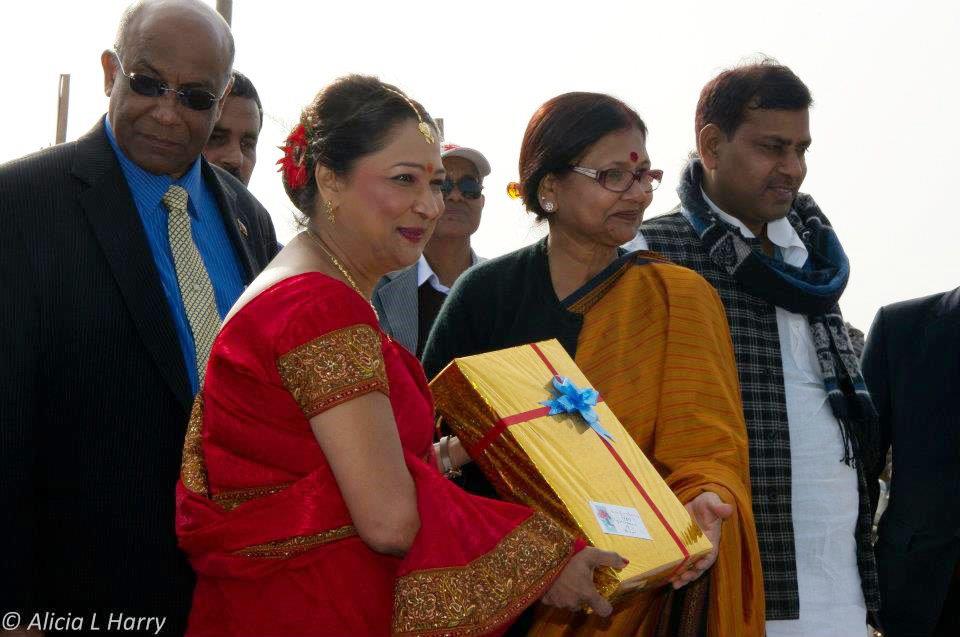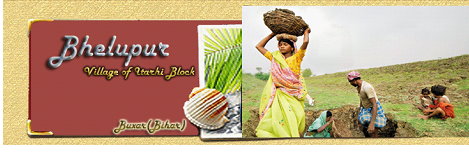|
Alternative to Crossing the Kala Pani
Posted: Sunday, January 29, 2012
By Stephen Kangal
January 29, 2011

PM Kamla Persad-Bissessar Meeting with her relatives and receiving a Gift during the visit to her inaccessible ancestral village of Bhelupur in Indian state of Bihar
The official visits undertaken by Prime Ministers Panday (1997) and Bissessar-Persad ( 2012) to their respective ancestral homeland villages located in North India after receiving the Pravasi Samaan Awards bring into sharp focus the truth inherent in the maxim that God works in mysterious ways His wonders to behold.
During the Bhelupur visit I saw animals accommodated in mud-hut "pens" similar to that of the thatched-roof, humble housing accommodation that the villagers still call home or "ghar ki matee aur thatchee".
The journey of the "jahajee girmitiyas" to the Caribbean and especially to "Chinidad" starting with the Fath Al Razak in 1845, involved being tricked by the "arkatias" by being told that they were going to "chalay chinee" in Chinidad". They had to trek from the isolated and remote villages of Uttar Pradesh and Bihar to reach Calcutta, the port of embarkation, the monument of which was visited by the PM during her recent visit. They then navigated the treacherous and dangerous Kala Pani (Black Waters) arriving after enduring the harshest sailing maritime conditions at the Nelson Island holding station to face a hostile African host environment. Their first act upon arrival was to seek the blessings and connect with Dharti Mata by touching the soil of Nelson Island. They never forgot their "dharti mata" ancestral cultural linkages throughout their toils and sweat in the cane-fields of Caroni.
These guest workers carrying their simple "jahajee" bundles were contracted (bound coolies) to do the servile, back-breaking work on the sugar-cane fields abandoned post-1838 by their African counterparts. They lived in sub-human conditions in the Caroni barracks, sleeping on "pals", eating salt and rice, drinking the water of the Caroni River, reciting the Hanuman Chalisa, Gayatri Mantra and Tulsidas' Ramcharitarmanas written in their Bojpuri (Patois Hindi) dialect. I am told that the Caroni barracks were superior to what they left behind in their ancestral villages dominated by cruel "zamindars".
But after the lapse of 167 years when both Prime Ministers Panday and Persad-Bissessar visited their ancestral villages of Lakshmanpur (Uttar Pradesh) and Bhelupur (Bihar) respectively time and progress seemed to have stood still for these villagers. The two villages like so many others in India remained isolated and inaccessible with roads having to be built to afford the visits of the PM's who had to travel via helicopters.
I had previously come to the conclusion that had our "girmitiyas" ancestors not taken that qualitative and heroic leap to brave overwhelming adversity and defy their karmic prescriptive baggage to seek out new Caribbean pastures for earning a better life, their off-springs- the now generation would have been consigned to a life of penury and poverty, isolationism and anonymity like the Bhelupuris and Lakshmanpuris today. That is the stark reality that we must confront and face that that fate would have been the harsh alternative to the brave crossing of the Kala Pani en route to unknown lands via turbulent voyages when many perished and were thrown over-board unceremoniously. That is the dilemma that the African community must also face and rationalize in their own minds as to whether they are better off here in T&T than in their African countries from where Africans are daily risking their lives at sea to enter the Mediterranean countries.
Why would Indians of the Caribbean diaspora want to return to India when in T&T we have built "havelis" and "tajs". But we cannot be separated and disjointed from our recollection of our historic past and ancestral memory even though the principle of the territorial imperative of birth binds us to Mother T&T.
T&T today will not have had the socio-economic boon spawned by the East Indian contribution. This is why the Indo-Trinbagonian today does not seek reparation from anyone for his harsh period of indenture-ship.
The girmitiya believes that he was being sent on a Mission to the Caribbean. He is not wasting intellectual time promoting hostility against the English and their colonial system and seeking blood money. He almost suggests that colonialism is embedded in all human psyche and not the exclusive preserve of the Europeans. That is justified from the empirical evidence and experiences of post-1956 T&T.
The jahajees were able to take on and respect the English sahib. His socio-economic status in Bihar and Uttar Pradesh were inferior to what he had in Caroni. He retained his cultural practices by his own efforts contrary to the African view that the English allowed the Indians to retain their culture. The English recognized the civilized culture of the Indians with his language, books and Hindu/Islamic way of life. He used the land (Dharti Mata) as the launching pad to attaining literacy, social mobility and economic well-being. He could not have achieved this alone without the help of some Canadian missionaries starting with Rev John Morton in Iere Village, Princes Town in 1868 and the Sanatan Dharma Maha Sabha (SDMS) in 1953.
It is the civilized appraoch for the populace to appreciate and empathise with the complex cultural distinctiveness and persistence of the Indo-Trinbagonian, his embedded cultural memory/ancestry and discard this "all ah we is one" foolish placebo. As a product of 6,000 years of the Indus Valley civilization he has the resilience, the cultural platform and the character to overcome all hurdles en route to social and economic mobility and progress as the past 100 years have amply demonstrated. The entrepreneurial ethic is firmly planted in the mind of the Indo-Trinbagonian.
Bring on the policy, programmes and priorities of effective diversity management and conservation to harness the enormous human capital and capacity endemic in our cosmopolitanism.

Share your views here...
 Send page by E-Mail Send page by E-Mail
|
|